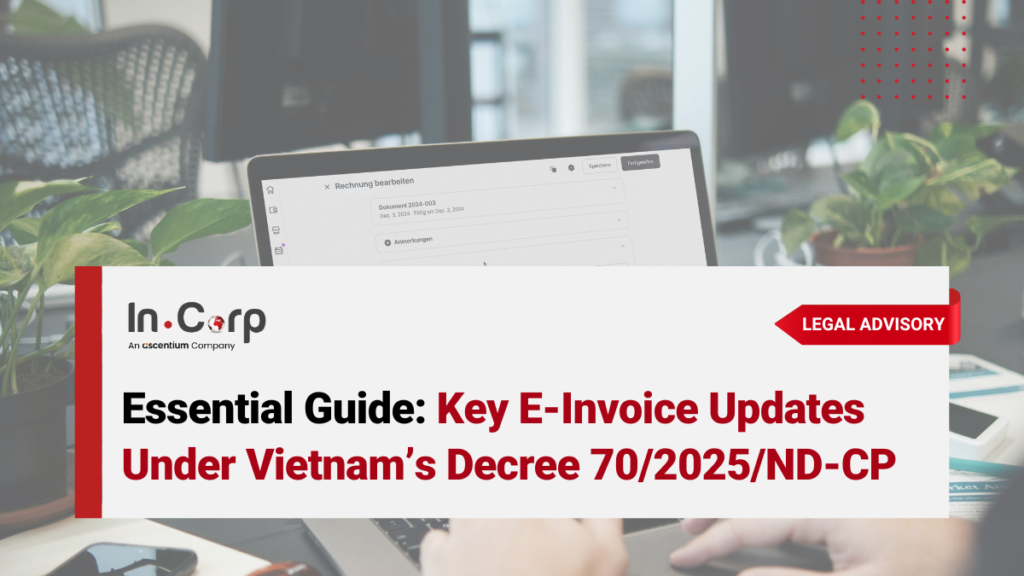In alignment with our commitment to keeping clients informed of regulatory developments impacting business operations in Vietnam, we provide a detailed overview of Decree No. 70/2025/ND-CP, effective from June 1, 2025. This decree amends and supplements Decree No. 123/2020/ND-CP, introducing significant changes to e-invoicing regulations, including the process invoice procedures, to enhance tax transparency, streamline compliance, and accommodate digital and cross-border business models.
To ensure your business stays compliant with the latest tax regulations, including e-invoicing, explore our accounting outsourcing in Vietnam.
1. Regulated Entities
Decree No. 70/2025/ND-CP expands the scope of e-invoicing to include foreign suppliers without permanent establishments in Vietnam who engage in e-commerce, digital platform-based businesses, or other services (e.g., online advertising, cloud services, or app-based services). These suppliers may voluntarily register e-invoice to issue electronic VAT invoices through the General Department of Taxation’s (GDT) dedicated web portal, which is part of the e-invoice system. Registration involves submitting Form No. 01/DKTD-HDDT (Appendix IA) and obtaining a GDT-approved digital signature. This aligns with Vietnam’s efforts to enforce tax compliance in cross-border digital trade.
Additionally, household businesses and individual businesses can now authorize third parties (e.g., e-invoice system service providers) to issue e-invoices on their behalf, provided a formal agreement is in place specifying the invoice type, responsibilities, and data transmission protocols. This is particularly beneficial for small-scale sellers on platforms like Shopee or Lazada, who can now more easily register e-invoice and use the e-invoice system. Decree No. 123/2020/ND-CP did not address foreign suppliers or third-party issuance.
Read More: A Guide to E-commerce Taxes in Vietnam in 2025
2. Invoicing Timelines
Decree No. 70/2025/ND-CP introduces precise timelines for e-invoice issuance across various transactions to streamline the process invoice requirements:
- Export of Goods: For goods exports, including processing for export, electronic commercial invoices, VAT invoices, or sales invoices must be issued no later than the working day following customs clearance, as per customs regulations. Exporters can determine the exact issuance time within this period, offering flexibility. This contrasts with Decree No. 123/2020/ND-CP, which lacked specific guidance for export goods.
- Service Provision: Invoices for services, including those provided to foreign organizations or individuals, must be issued upon completion of service delivery, regardless of payment status. This rule aligns with Decree No. 123/2020/ND-CP but is now explicitly extended to cross-border services.
- Sector-Specific Timelines: New provisions address high-volume services (e.g., electricity, water, banking, insurance, and passenger transport). For example, invoices for banking services must include budget-related unit codes, while transport service invoices require sender details and goods descriptions. These were not detailed in Decree No. 123/2020/ND-CP.

3. Invoices Generated by POS Cash Registers
Decree No. 70/2025/ND-CP mandates that business households and individual businesses with annual revenue of VND 1 billion (approximately USD 38,400) or more, as well as enterprises in consumer-facing sectors (e.g., shopping malls, supermarkets, restaurants, hotels, passenger transport, arts, entertainment, and personal services), must use POS cash registers connected to the GDT for real-time data transmission within the e-invoice system. These e-invoices must include:
- Buyer details (name, address, tax code, or personal identification number, if requested).
- Itemized goods/services, unit price, quantity, and payment price.
- For VAT deduction method payers, the selling price excluding VAT, VAT rate, VAT amount, and total including VAT.
- A tax authority code or QR code for buyers to access invoice data.
Businesses must register e-invoice for their POS systems with the GDT, ensure technical compatibility, and comply with XML data formats. Decree No. 123/2020/ND-CP did not regulate POS-generated e-invoices.
Read More: Guide to Bookkeeping for Tax Compliance
4. Invoice Types
Decree No. 70/2025/ND-CP introduces flexibility in invoice types for exporters and export processing enterprises (EPEs):
- Exporters: Can issue electronic commercial invoices if they meet GDT data transmission requirements (e.g., XML format and electronic transfer). Otherwise, they use electronic VAT invoices (for VAT deduction method) or electronic sales invoices (for direct VAT method). This is an expansion from Decree No. 123/2020/ND-CP, which limited exporters to VAT or sales invoices.
- Export Processing Enterprises (EPEs): For non-export activities (e.g., domestic sales), EPEs must use sales invoices if declaring VAT via the direct method or VAT invoices if using the credit-invoice (deduction) method. Decree No. 123/2020/ND-CP did not address EPEs’ non-export activities.
- Other Invoices: The decree retains VAT invoices for VAT deduction method payers and sales invoices for direct method payers, with new provisions for national reserve goods and public property sales.
5. Name of Goods/Services, Unit, Quantity, Unit Price
For sales promotions, gifting, or donations under commercial laws, Decree No. 70/2025/ND-CP requires an e-invoice reflecting the total value of goods or services, accompanied by a detailed list of items. For example, a promotional campaign invoice must include specifics like “Samsung Galaxy S25, 10 units, VND 20 million each.” Businesses must retain records of these campaigns for tax audits. This requirement was absent in Decree No. 123/2020/ND-CP.
Invoices must be in Vietnamese, with other languages permitted only as supplementary text. Goods/services must be clearly described (e.g., “Nokia 3310” instead of “mobile phone”).

6. Replacement and Correction of E-Invoices
Decree No. 70/2025/ND-CP replaces the invoice cancellation process with streamlined correction and replacement procedures to simplify the process invoice:
- Multiple Errors: If errors (e.g., buyer details, goods, unit price, or tax rate) occur on multiple invoices issued to the same buyer in a month, sellers can issue a single correction or replacement invoice accompanied by Form No. 01/BK-DCTT (Appendix IA), listing erroneous invoices.
- Pre-Correction Requirements:
- For enterprise buyers, a written agreement between seller and buyer must document the errors.
- For individual buyers, sellers must notify errors via direct communication or their website.
- Compliance: Sellers must retain correction agreements and submit them during tax audits. Failure to correct errors promptly may trigger inspections. Decree No. 123/2020/ND-CP lacked these provisions.
7. Digital Signature and Issuance Date
Decree No. 70/2025/ND-CP allows flexibility in digital signatures and tax submission within the e-invoice system:
- Digital Signature: The digital signature and submission to the GDT (for authenticated or unauthenticated e-invoices) must occur no later than the working day following the issuance date. POS-generated e-invoices are exempt from digital signatures.
- Tax Declaration:
- Sellers: Use the issuance date for tax declaration.
- Buyers: Use the receipt date of a correctly formatted invoice.
Decree No. 123/2020/ND-CP used only the issuance date for tax declaration, without distinguishing between sellers and buyers.
8. Handling of E-Invoices for Returned Goods or Services
For full or partial returns of goods or services, including exchanges affecting value, Decree No. 70/2025/ND-CP provides two options:
- Seller Issues Correction Invoice: The seller issues an e-invoice to adjust the original invoice’s value or details.
- Buyer Issues E-Invoice: If agreed in writing, the buyer can issue an e-invoice for returned goods, specifying the returned items and value.
Decree No. 123/2020/ND-CP restricted return invoicing to sellers and required a written agreement. The new provision enhances flexibility for both parties.
9. Additional Compliance Requirements
- Prohibited Actions: Decree No. 70/2025/ND-CP introduces penalties for:
- Failure to transmit e-invoice data to the GDT.
- Issuing or using forged invoices.
- Selling smuggled, banned, or counterfeit goods via e-invoices.
- E-Invoice Format: E-invoices must use the XML format, with a numbering structure including a form number (1–9, based on invoice type) and a 6-character reference code indicating issuance year and authentication status.
- Consumer Incentives: Circular 32/2025/TT-BTC, complementing Decree No. 70/2025/ND-CP, encourages consumers to request e-invoices by requiring businesses to provide printed or digital copies (e.g., via QR code) for B2C transactions.
How Can InCorp Vietnam Help?
Given that the e-invoicing compliance process in Vietnam, as outlined in Decree No. 70/2025/ND-CP, is complex and demands strict adherence to regulatory timelines and requirements, it is essential to engage certified professionals adept at navigating the intricacies of electronic invoicing regulations. The detailed stipulations for e-invoice issuance, correction, and digital connectivity with tax authorities require a deep understanding of both local tax laws and digital compliance standards.
InCorp Vietnam provides comprehensive support to businesses, ensuring your e-invoicing processes are fully compliant with all regulatory requirements. Our experts stay abreast of the latest legislative updates, including those introduced by Decree No. 70/2025/ND-CP, and offer tailored guidance to meet your specific needs. We handle everything from initial system assessments to implementing e-invoice system solutions, correcting erroneous invoices, and ensuring seamless integration with the General Department of Taxation’s platforms.
If you need assistance with navigating these complex e-invoicing regulations, our team of experts is here to help. Contact us today to learn more about our Business Tax Advisory services.
Learn the Right Setup for Business
Expansion in the Vietnam
Frequently Asked Questions
How does an e-invoice work?
- An e-invoice (electronic invoice) in Vietnam is a digital version of a traditional paper invoice that complies with the government's prescribed format and is submitted through the General Department of Taxation (GDT) system. Businesses must issue e-invoices for each transaction, and the data is automatically transmitted to the tax authority for real-time monitoring. The system ensures accuracy, reduces paperwork, and enhances tax compliance. From July 1, 2022, all enterprises in Vietnam are required to use e-invoices.
How To Issue A Replacement Invoice In Vietnam Vat Correction 8% 2024
- To issue a replacement invoice in Vietnam for a VAT correction to 8% in 2024, cancel the original invoice and issue a new one with the correct VAT rate, referencing the original invoice number and reason for correction. Ensure compliance with Circular 78/2021/TT-BTC and relevant guidance from the General Department of Taxation.
How To Submit E Invoicing Shopee
- To submit e-invoicing on Shopee, log in to your Shopee Seller Centre, go to the "Finance" or "My Invoices" section, and follow the prompts to upload or generate your e-invoice. Ensure all required details are accurate before submission.
Is e-invoicing mandatory in Vietnam?
- Yes, e-invoicing is mandatory in Vietnam. As of July 1, 2022, all businesses, organizations, and individuals conducting commercial activities must use electronic invoices (e-invoices) as required by Decree 123/2020/ND-CP and guided by Circular 78/2021/TT-BTC.






